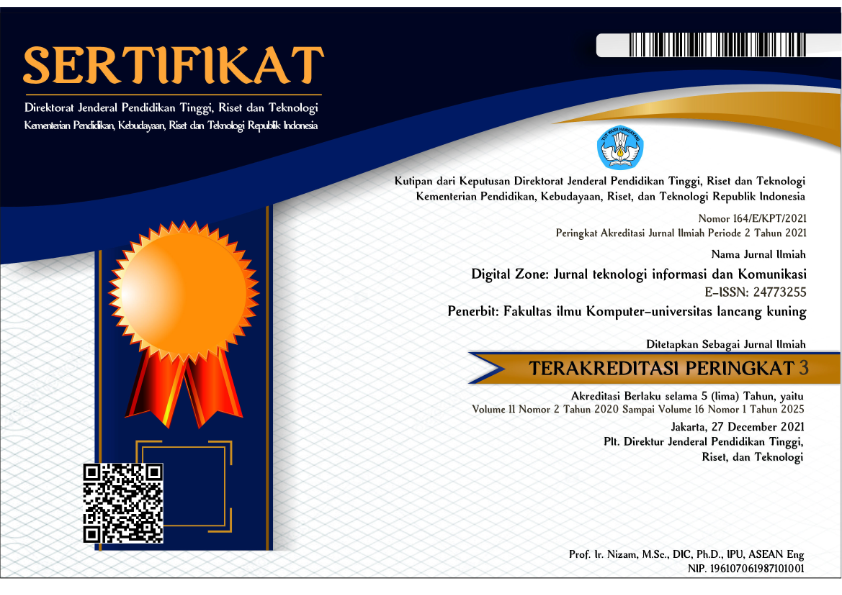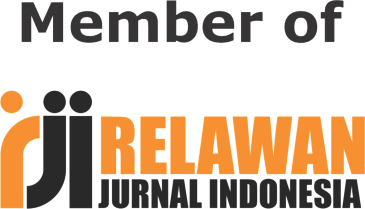Analisa Kualitas Layanan Sistem Smart Unilak Menggunakan Servqual Method
DOI:
https://doi.org/10.31849/digitalzone.v11i2.5331Keywords:
Kualitas Layanan, Smart Unilak, Servqual, Sistem InformasiAbstract
Keberhasilan suatu layanan, dilihat dari sisi pandang / persepsi user dari Sistem Informasi tersebut. Pengguna menggunakan persepsinya, untuk menilai secara keseluruhan terhadap kualitas sistem informasi. Tujuan dari penelitian ini untuk mengetahui pengaruh dimensi Service Quality (servqual) yakni Tangibles, Reliability, Responsiveness, Assurance dan Empathy, terhadap Kualitas Layanan yang terkait dengan Kepuasan Mahasiswa sebagai Pengguna SMART Unilak di layanan PDPT Unilak. Dari 981 mahasiswa Fasilkom, maka yang menjadi objek penelitian ini adalah 64 mahasiswa yang mengisi kuisioner dan sesuai kriteria. Dalam penelitian ini teknik sampling yang digunakan yaitu Nonprobability sampling dengan teknik purposive sampling dengan kriteria yang ditetapkan adalah mahasiswa aktif, pernah menggunakan Smart Unilak dan pernah berhubungan langsung dengan layanan PDPT Unilak. Hasil uji korelasi memperlihatkan hubungan positif serta signifikan dari 5 (lima) variable bebas, yaitu variabel assurance, tangible, reliability, responsiveness, serta empathy dari Kualitas Layanan Sistem Informasi SMART Unilak. Kontribusi variabel tangibles; reliabilitys; responsivenes; assurance, serta empathy untuk menambah Kualitas Layanan pada PDPT Unilak secara berurutan adalah sebesar 17.90%, 4.60%, 30.76%, 45.92%, -11.13%. Sesuai perhitungan skor Service Quality, maka diperoleh kesenjangan atau Gap untuk masing-masing variabel bebas yiatu tangibl; reliability; responsiveness; assurance; dan empathy yang nilainya secara berurut adalah -0.8, -0.55, -0.69, -0.75, -0.59. Hasil penelitian menunjukkan masih kurang baiknya kualitas dari tangible; reliability; responsiveness; assurance; dan empathy, serta tingkat kepuasan pengguna terhadap Kualitas Layanan Sistem Informasi SMART Unilak pada PDPT Unilak masih kurang puas.
Kata kunci: Kualitas Layanan, Smart Unilak, Servqual, Sistem Informasi
Abstract
The success of a service, seen from the point of view / user perception of the Information System. Users use their perceptions, to assess the overall quality of the information system. The purpose of this study was to determine the effect of Service Quality (servqual) dimensions, namely Tangibles, Reliability, Responsiveness, Assurance and Empathy, on Service Quality related to Student Satisfaction as Unilak SMART Users in Unilak PDPT services. Of the 981 students of Fasilkom, 64 students filled out the questionnaire according to the criteria. In this study, the sampling technique used was nonprobability sampling with purposive sampling technique with the criteria set were active students, had used Smart Unilak and had direct contact with PDPT Unilak services. The results of the correlation test show a positive and significant relationship from 5 (five) independent variables, namely the assurance, tangible, reliability, responsiveness, and empathy variables of the Unilak SMART Information System Service Quality. Contribution of the tangibles variable; reliabilitys; responsivenes; assurance, and empathy to increase Service Quality at PDPT Unilak were 17.90%, 4.60%, 30.76%, 45.92%, -11.13%, respectively. In accordance with the calculation of the Service Quality score, a gap is obtained for each of the independent variables, namely tangibl; reliability; responsiveness; assurance; and empathy whose values are -0.8, -0.55, -0.69, -0.75, -0.59 respectively. The results showed that the quality of the tangible was not good enough; reliability; responsiveness; assurance; and empathy, and the level of user satisfaction with the Unilak SMART Information System Service Quality at PDPT Unilak is still not satisfied.
Keywords: Service of Quality, Smart Unilak, Servqual, Information Systems.
References
V. M. Ngo and H. H. Nguyen, “The relationship between service quality, customer satisfaction and customer loyalty: An investigation in Vietnamese retail banking sector,” J. Compet., 2016.
E. Garga and A. J. Bambale, “The Impact of Service Quality on Customer Patronage: Mediating Effects of Switching Cost and Customer Satisfaction.,” Int. J. Glob. Bus., vol. 9, no. 1, 2016.
P. Nambisan, D. H. Gustafson, R. Hawkins, and S. Pingree, “Social support and responsiveness in online patient communities: impact on service quality perceptions,” Heal. Expect., vol. 19, no. 1, pp. 87–97, 2016.
P. Kotler and G. Armstrong, Principles of marketing. Pearson education, 2010.
H. Fadil, K. Singh, and C. Joseph, “The influence of organizational innovation towards internal service quality in MBKS,” Procedia--Social Behav. Sci., vol. 224, pp. 317–324, 2016.
P. Sharma, T. T. C. Kong, and R. P. J. Kingshott, “Internal service quality as a driver of employee satisfaction, commitment and performance,” J. Serv. Manag., 2016.
V. A. Zeithaml and A. Parasuraman, Service Quality. Marketing Science Institute, 2004.
M. Kumar, K. S. Sujit, and V. Charles, “Deriving managerial implications through SERVQUAL gap elasticity in UAE banking,” Int. J. Qual. Reliab. Manag., 2018.
M. Mujinga, “Retail banking service quality measurement: SERVQUAL gap analysis,” in 2019 Conference on Information Communications Technology and Society (ICTAS), 2019, pp. 1–6.
M. Khadem Rezaiyan and others, “Quality Gap in educational services based on SERVQUAL Model in Mashhad Medical School,” Res. Med., vol. 40, no. 1, pp. 17–23, 2016.
M. Jebraeily, B. Rahimi, Z. Zare Fazlollahi, and H. Lotfnezhad Afshar, “Using SERVQUAL model to assess hospital information system service quality,” Hormozgan Med. J., vol. 23, no. 1, p. e86977, 2019.
Y. Wismantoro, H. Himawan, and K. Widiyatmoko, “The effect of IS SERVQUAL and user information satisfaction (UIS) adoption on user satisfaction,” Uncertain Supply Chain Manag., vol. 8, no. 3, pp. 495–504, 2020.
W. Wahyudi, R. Ruliah, and Y. Yudihartanti, “Analisa Tingkat Kualitas Pelayanan Diklat Prajabatan BKD Banjarbaru Menggunakan Metode Servqual,” Jutisi J. Ilm. Tek. Inform. dan Sist. Inf., vol. 5, no. 3, 2017.
W. Utama, W. Lestari, and D. R. Ikmaluhakim, “Pengukuran Kepuasan Pasien Terhadap Pelayanan Puskesmas Dengan Metode Servqual (Studi Kasus: Puskesmas Ngagel Rejo Surabaya),” 2017.
M. S. Paramita, W. A. P. Dania, and D. M. Ikasari, “Penilaian Kepuasan Konsumen Terhadap Kualitas Pelayanan Menggunakan Metode Servqual (Service Quality) Dan Six Sigma (Studi Kasus Pada ‘Restoran Dahlia’ Pasuruan),” Ind. J. Teknol. dan Manaj. Agroindustri, vol. 4, no. 3, pp. 102–115, 2017.
A. P. Rahayu, H. B. Santoso, and S. Rahayuningsih, “Analisa Kepuasan Sistem Informasi Akademik Mahasiswa Menggunakan E-Servqual,” JATI UNIK J. Ilm. Tek. dan Manaj. Ind., vol. 2, no. 1, pp. 55–63, 2019.
R. Ekasari, M. S. Pradana, G. Adriansyah, M. A. Prasnowo, A. F. Rodli, and K. Hidayat, “Analisis Kualitas Pelayanan Puskesmas Dengan Metode Servqual,” J. Darussalam J. Pendidikan, Komun. Dan Pemikir. Huk. Islam, vol. 9, no. 1, pp. 86–93, 2017.
N. Luh, A. Kartika, and Y. Sarja, “Pengukuran Kepuasan Pengguna Sistem Informasi Dosen Menggunakan Metode Servqual,” J. Sist. DAN Inform., pp. 19–25, 2018.









